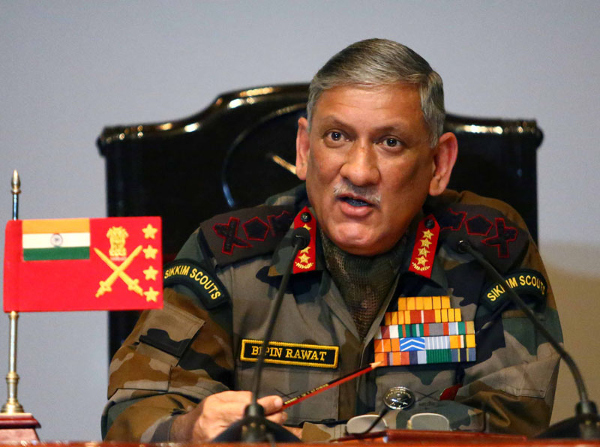New Delhi: Future conflicts will be more violent and unpredictable with battlefields being severely contested and seamlessly connected. In future, even conventional conflicts are likely to have a large asymmetric component leading to ‘hybrid war’. According to Army Chief General Bipin Rawat, technology has become a key driver of future wars.
The United States military sees cyberspace as the “fifth domain” of warfare alongside land, air, sea, and space. Similarly, the Department of Defense (DoD), the National Security Agency (NSA), and the Central Intelligence Agency (CIA) are getting increasingly dependent on technology to track terrorist organisations and destroy their enemy’s fighting capabilities through sophisticated virus strikes and malware.
The Indian security forces need to be prepared for a multi-spectrum war as with the rise of non-state actors and the rapid changes in technology the nature of warfare has witnessed a paradigm shift.
While India is slowly gearing up to face the multifaceted nature of asymmetrical warfare, it requires a strategic vision to counter threats, both internal and external.
Here are few steps India is taking to rise up to the challenge.
Private players: Bring ’em in
It’s a matter of grave concern that despite doing a phenomenal job in areas like space, India still relies on imported information techniques which could be fatal in the future. When India required GPS data for the region during the Kargil war, the US denied it after which a need for an indigenous satellite system was felt.
When all the modern-day weapons are being managed by computers, India cannot risk itself by being dependent on foreign-made systems. The idea is to cut this dependency on foreign manufactures for which the government needs to bring private players in the game to protect India’s interests.
Prime Minister Narendra Modi’s flagship programme ‘Make in India’ can receive a big boost if private players along with the Defence PSUs work together to secure the country’s interests.
Cyberwarfare: Countering threats from nation-states
In 2018, Cosmos Bank, India’s oldest urban co-operative bank, became the victim of a cyber-attack losing USD 13.5 million. The attack was carried out by North-Korean hackers by executing a malware attack on the vulnerable system.
The attack was so advanced and sophisticated that it bypassed three main layers of defence. The UNSC panel in its report said that North Korean hacker group Lazarus could be behind it.
According to the report, cyber-attacks by DPRK have turned into an important tool to evade sanctions and secure funds for the cash-strapped nation.
To understand the severity of cyber-attacks and what they can achieve, Estonia can serve as an ideal case study. In April 2007, this small Baltic country was hit by a wave of advanced cyber-attack which crippled the country’s network. Fake news sparked widespread riots, people were unable to withdraw money or do online transaction, reporters were not able to upload their stories and online government facilities remained inaccessible.
This modern form of hybrid warfare remains etched in the psyche of every Estonian in a way that it made them realise the importance of cybersecurity. Today, Estonia is internationally recognised and valued for its cybersecurity experts.
Protecting the eyes in the sky
PM Narendra Modi-led BJP National Democratic Alliance government has finalised a new defence space agency which will be entrusted with protecting India’s interests in outer space and deal with threats of space wars.
The agency will be developing a range of platforms and co-orbital weapons to protect Indian assets in space to act as a deterrence. Apart from this Defence Space Research Organisation (DSRO) has also been created which will provide technical and research support to its parent organisation, the Defence Space Agency.
Roman military expert Vegetius in his military treatise De re military gave a phrase “Si vis pacem, para bellum”. Translated from Latin to English, this phrase reads: “If you want peace, prepare for war”.
With emerging contours of warfare, it is important for a developing country like ours to be armed, alert and prepared to defend oneself in an increasingly unpredictable world.
Source: TNN
Image Courtesy: Columbian Gazette
You may also like
-
IAF Aircraft Set Course For Exercise Eastern Bridge VII At Oman
-
IAF Set To Host The Indian Defence Aviation Exposition-II At Jodhpur
-
Defence Secretary to co-chair 5th India-Philippines Joint Defence Cooperation Committee meeting in Manila
-
Simultaneous Launch Of ‘malpe And Mulki’, Fourth And Fifth Ships Of Asw Swc (Csl) Project
-
Aatmanirbharta in Defence: MoD signs Contract with HAL for 240 AL-31FP Aero Engines for Su-30MKI Aircraft
